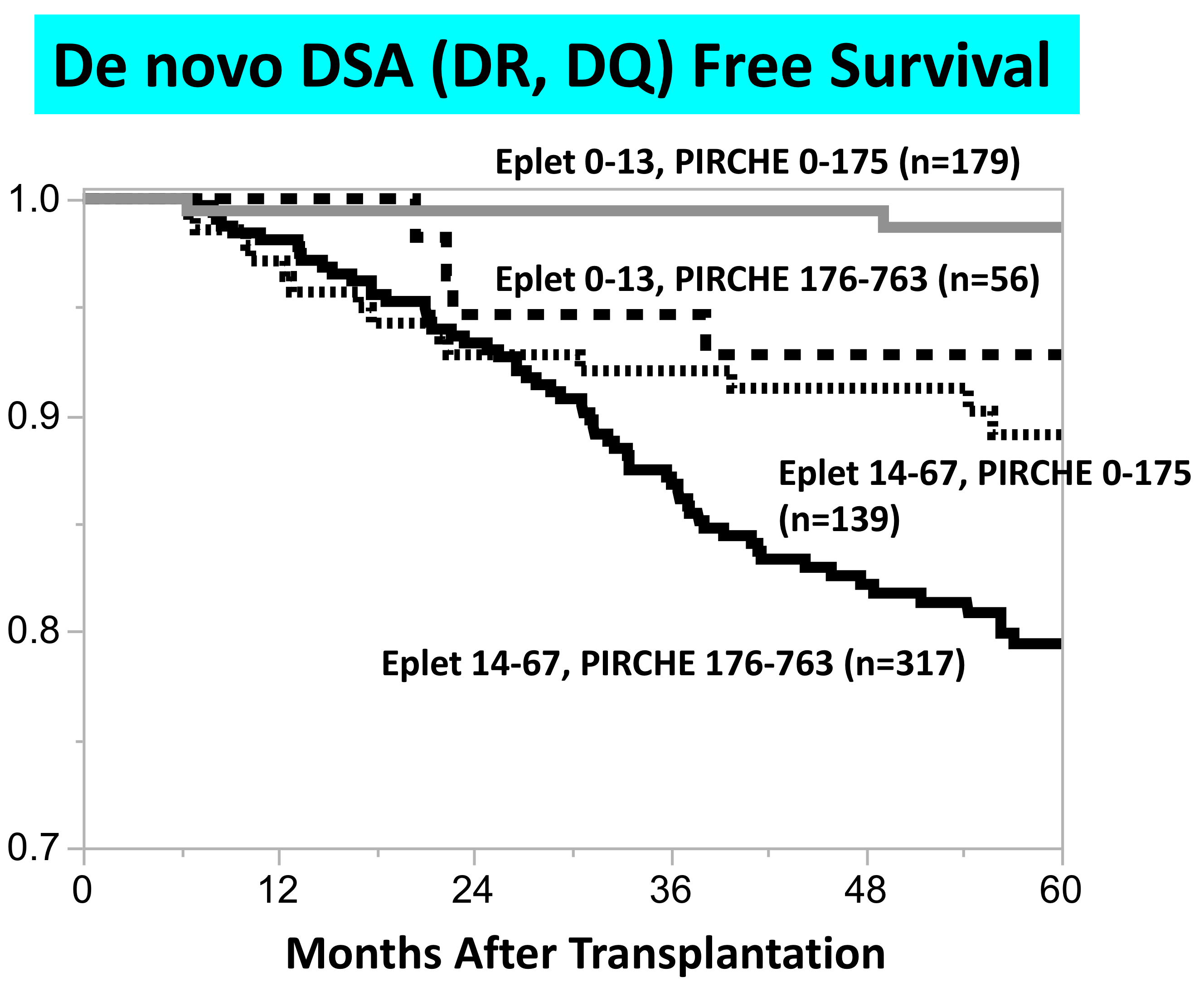Clinical Significance of T Cell and B Cell Epitope Prediction as a Risk Factor of De Novo DSA Production after Kidney Transplantation
1Aichi Medical University School of Medicine, Nagakute, Japan, 2Nagoya Daini Red Cross Hospital, Nagoya, Japan, 3PIRCHE AG, Berlin, Germany, 4UMC Utrecht, Utrecht, Netherlands
Meeting: 2020 American Transplant Congress
Abstract number: 243
Keywords: Epitopes, HLA antibodies, Indirect pathway, Kidney transplantation
Session Information
Session Name: Kidney Chronic Antibody Mediated Rejection
Session Type: Oral Abstract Session
Date: Saturday, May 30, 2020
Session Time: 3:15pm-4:45pm
 Presentation Time: 3:15pm-3:27pm
Presentation Time: 3:15pm-3:27pm
Location: Virtual
*Purpose: Chronic antibody-mediated rejection caused by de novo DSA (dnDSA) is a major cause of graft failure. Risk prediction of dnDSA would be important for long term graft outcome. The degree of mismatch (eplet MM) in B cell epitope recognized by BCR seems to have a direct influence on DSA production. Predicted number of T cell epitopes recognized by TCR at the first step towards DSA production in T-dependent B cell activation can be assessed by PIRCHE (Predicted indirectly recognizable HLA epitopes) score. The purpose of this study was to elucidate association between eplet MM level /PIRCHE score and dnDSA production.
*Methods: 691 living donor kidney transplantations between 2008 and 2015 were enrolled in the retrospective cohort study. Patients with preformed DSA were excluded. HLA-DRB1345 and DQB1 eplet MM level and PIRCHE score (4 digit of HLA-A, B, DR and DQ) were determined by HLA matchmaker and PIRCHE-II Matching Service, respectively. dnDSA production was annually monitored from 2009 to 2018. Screening and specificity tests were conducted. MFI >1000 in LABScreen SAB was considered positive.
*Results: (1) No significant correlation between eplet MM and PIRCHE score was observed, but both were associated with classical HLA MM levels. (2) Eplet MM level was significantly related to incidence of dnDSA production (8/235 (3.4%) in eplet MM≤13 vs 92/456 (20.2%) in eplet MM≥14, p<0.001). PIRCHE score was also significantly related to dnDSA production (26/318 (8.2%) in PIRCHE≤175, 74/373 (19.8%) in PIRCHE≥176, p<0.001). Patients with low levels of both eplet MM and PIRCHE score developed dnDSA only in 4/179 (2.2%) (Table 1). (3) Multivariate analysis of Cox hazard regression model revealed that high eplet MM (p=0.0029), high PIRCHE score (p=0.034) and acute TCMR (p<0.001) were significantly associated with dnDSA production.
*Conclusions: Analysis of T cell and B cell epitopes would provide a beneficial information on individualized immunosuppression for prevention of dnDSA production.
| 0-13 (Eplet MM) | 14-67 (Eplet MM) | |
| 0-175 (PIRCHE) | 4/179 (2.2%) | 22/139 (15.8%) |
| 176-763 (PIRCHE) | 4/56 (7.1%) | 70/317 (22.1%) |
To cite this abstract in AMA style:
Kobayashi T, Iwasaki K, Tomosugi T, Miwa Y, Niemann M, Spierings E, Horimi K, Matsuoka Y, Takeda A, Goto N, Narumi S, Watarai Y. Clinical Significance of T Cell and B Cell Epitope Prediction as a Risk Factor of De Novo DSA Production after Kidney Transplantation [abstract]. Am J Transplant. 2020; 20 (suppl 3). https://atcmeetingabstracts.com/abstract/clinical-significance-of-t-cell-and-b-cell-epitope-prediction-as-a-risk-factor-of-de-novo-dsa-production-after-kidney-transplantation/. Accessed February 14, 2026.« Back to 2020 American Transplant Congress

